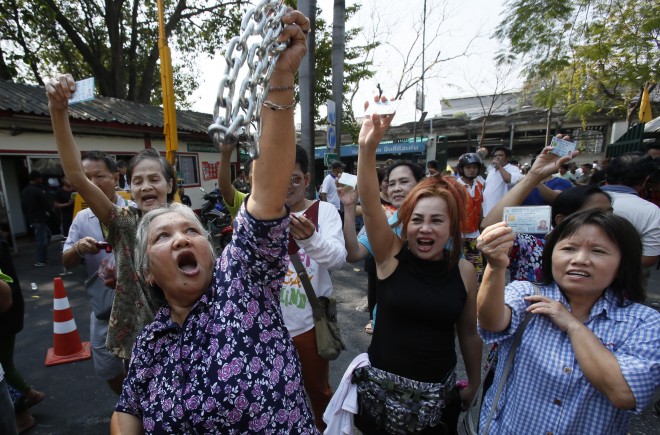Timeline: Key dates in Thai political crisis

Voters hold their identification cards and the chains that held the gate of the polling station closed, as they demand the right to vote during general elections in Bangkok, Thailand, Sunday, Feb. 2, 2014. AP Photo/Wally Santana)
BANGKOK—Following is a timeline of the main events in Thailand’s political crisis since controversial tycoon-turned-politician Thaksin Shinawatra was ousted as premier more than seven years ago:
2006
Sept. 19: The military seizes power in a bloodless coup while Thaksin is in New York. More than a year of military rule follows.
2007
June: An antigraft panel freezes Thaksin’s assets.
Article continues after this advertisementDecember: The People Power Party, comprising Thaksin’s allies, wins elections and goes on to form a coalition government.
Article continues after this advertisement2008
May: Royalist anti-Thaksin “Yellow Shirts” relaunch street protests that precipitated the 2006 coup.
September: A state of emergency is declared after clashes between pro- and antigovernment groups that left one person dead and dozens wounded. The Constitutional Court strips Thaksin-allied Premier Samak Sundaravej of his powers, ruling he illegally accepted payments for hosting TV cooking shows. Thaksin’s brother-in-law Somchai Wongsawat takes his place.
October: Clashes between police and demonstrators leave two people dead and nearly 500 wounded. A court sentences Thaksin in absentia to two years in jail for corruption after he flees the country.
November-December: Thousands of Yellow Shirts blockade Bangkok’s airports. A state of emergency is imposed for nearly two weeks.
December: The Constitutional Court dissolves Somchai’s party, forcing him from office. British-born Abhisit Vejjajiva of the Democrats becomes premier in a parliamentary vote with military backing, leading a six-party coalition.
2009
January-March: “Red Shirts” loyal to Thaksin stage mass protests in the capital against Abhisit’s government.
April: Red Shirts storm the venue of an Asian summit in the beach resort of Pattaya, forcing the evacuation of regional leaders. Riots and a 12-day state of emergency in Bangkok ensue, leaving two people dead.
2010
February: The Supreme Court confiscates $1.4 billion of Thaksin’s wealth after ruling he abused his power.
March: Tens of thousands of Red Shirts begin rolling demonstrations calling for Abhisit’s government to step down, saying it is elitist and undemocratic.
April-May: Street clashes between Red Shirt protesters and armed troops leave more than 90 people dead, mostly civilians, in the country’s worst civil unrest in decades.
2011
May: The government announces July 3 election. Thaksin’s youngest sister, Yingluck Shinawatra, emerges as the main opposition candidate for premier.
July: Thaksin’s allies sweep to power on a wave of support among their Red Shirt followers.
August: The Parliament elects Yingluck as Thailand’s first female prime minister.
2012
April: Addressing supporters from neighboring Laos, Thaksin vows to return by the end of the year.
June: The Parliament shelves debate on controversial legislation that opponents feared would open the door to Thaksin’s return.
November: Police fire tear gas and detain dozens of demonstrators as clashes erupt at the first major street protests against Yingluck’s government.
December: Authorities announce former Prime Minister Abhisit Vejjajiva and his deputy Suthep Thaugsuban will face murder charges linked to the 2010 crackdown. Twenty-four Red Shirt leaders go on trial on terrorism charges linked to the 2010 protests.
2013
October: Thousands of people join daily rallies in Bangkok against another controversial amnesty bill.
November: The Lower House of Parliament overwhelmingly passes legislation but the Upper House rejects it. Opposition protesters occupy the finance and foreign ministries demanding Yingluck to resign.
December: Police use water cannon and tear gas on protesters who storm the government and police headquarters. Opposition lawmakers resign en masse from parliament. Yingluck calls early elections as demonstrators return to the streets. The opposition announces a poll boycott, saying reforms are needed before the vote is held.
2014
January: Tens of thousands of opposition protesters occupy major intersections in the capital in an attempt to “shut down” Bangkok, vowing to stay put until Yingluck quits. Demonstrators besiege polling stations for advance voting in parts of the country, preventing hundreds of thousands casting ballots. The government rejects calls for an election delay in response to several bouts of political violence in which at least 10 people have been killed and hundreds injured.
February: A daylight gun battle shakes Bangkok as pro- and antigovernment protesters clash on the eve of the election. Polls open without major problems in central and northern Thailand but opposition demonstrators block voting in dozens of constituencies in the south and Bangkok.
RELATED STORIES
Thai protesters block voting in chaotic election